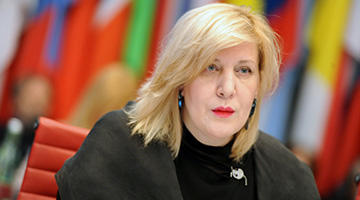
The recent attack against Petar Panjkota, reporter with RTL Croatia television, in Banja Luka, Bosnia and Herzegovina, is unacceptable and must be fully investigated, OSCE Representative on Freedom of the Media Dunja Mijatović said yesterday
Link: SEENPM
“I condemn the attack on Panjkota and call on the authorities to fully investigate this incident and prosecute the person responsible,” Mijatović said.
According to media reports, on 14 May, Panjkota was hit in the head by an unknown assailant shortly after finishing a live report from demonstrations in Banja Luka. The attack has been reported to the police.
“Journalists must be able to cover demonstrations in a free and safe manner. It is the duty of law enforcement to ensure that journalists can report safely,” Mijatović said.
On the same day, BN TV crew members Danina Milaković and Pavle Ivanović were verbally abused while covering the demonstrations. Meanwhile Vladimir Kovačević, also with BN TV, received threats on social media.
During her first official visit to Bosnia and Herzegovina in July last year, the Representative emphasized the importance of strengthening the safety of journalists and countering the climate of impunity. She addressed this issue with authorities both at the level of the two entities and at the State level.
“I reiterate my call on the authorities to ensure journalists’ safety; the media must be able to report on issues of public interest free from any form of intimidation,” Mijatović said.
The OSCE Representative welcomed prompt reactions by the Journalists’ Association of Bosnia and Herzegovina, the Journalists’ Association of Croatia, and the Press Club in Banja Luka, who all publicly condemned these attacks.
“There have been numerous attacks on journalists in Bosnia and Herzegovina where the assailants yet are to be prosecuted. Impunity for attacks on members of the media must stop,” Mijatović said.
This publication has been produced within the project European Centre for Press and Media Freedom, co-funded by the European Commission. The contents of this publication are the sole responsibility of Osservatorio Balcani e Caucaso and its partners and can in no way be taken to reflect the views of the European Union. The project's page

 OSCE: Attacks against journalists during demonstrations in B&H must be condemned and investigated
OSCE: Attacks against journalists during demonstrations in B&H must be condemned and investigated




 All the contents on the Osservatorio Balcani e Caucaso website are distributed with a
All the contents on the Osservatorio Balcani e Caucaso website are distributed with a 